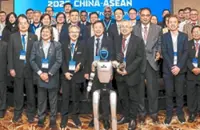THE World Health Organisation recently disclosed that disability and death due to Parkinson’s Disease have been increasing faster than any other neurological disorder globally. The report also stated that the prevalence of Parkinson’s has doubled in the past 25 years.
The most common and visible symptoms of Parkinson’s are tremors or shaking, which hinders patients’ eating routines as they cannot hold cutlery with a steady hand.





